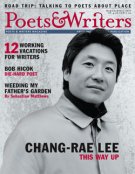The story goes like this: In 1984 Robert McDowell, a poet in southern Indiana who four years earlier had founded the Reaper, a literary magazine dedicated to narrative poetry, received $12,500 from the Nicholas Roerich Museum in New York City to start a small press. Twenty years later, the Reaper is deceased-the last issue was published in 1991, end of story-but Story Line Press (www.storylinepress.com) is still very much alive, having published books by Pulitzer Prize winners Rita Dove and Louis Simpson, Maxine Kumin, Alfred Corn, Donald Hall, and over two hundred others, including the winners of the annual Nicholas Roerich Poetry Prize and the Three Oaks Prize in Fiction. In its 20th anniversary year the press, now based in Ashland, Oregon, is publishing Story Hour: Contemporary American Narrative Poems, edited by Sonny Williams, and books of poems by Ginger Andrews, Judith Barrington, David Mason, and Diane Thiel.
When Sarabande Books (www.sarabandebooks.org), the 10-year-old nonprofit literary press based in Louisville, Kentucky, launched its Quarternote Chapbook series two years ago, the news elicited an appropriate level of enthusiasm-how nice!-and perhaps even a sense of relief: All is not lost if a small press can still publish the work of established poets like Frank Bidart and James Tate. Then Bidart's chapbook Music Like Dirt was nominated for the 2003 Pulitzer Prize (a 30-page book up for the Pulitzer!) and Louise Glück, whose Quarternote chapbook, October, will be published next month, was named U.S. poet laureate. Time will tell whether Charles Wright's The Wrong End of the Rainbow, the fourth addition to the series, to be published next year, will extend the streak of good fortune.
Which comes first: the literary magazine or the small press? Usually it's the magazine (obvious examples: Fence led to Fence Books, Verse to Verse Press, Slope to Slope Editions, Pleiades to Pleiades Press, Skanky Possum to Skanky Possum Press, and so forth). And so it goes with Brooklyn-based Anon. Books (www.anon.be), the small press that grew out of a literary magazine dedicated to publishing anonymous poems. The only difference is that the press has released three books, published in editions of 500 copies, in the last six months-Untitled Essays, The Laughing Alphabet, and do- re-, each by an anonymous writer, of course-while Anon. the magazine hasn't even published issue No. 1 yet. The first call for submissions to the journal went out two years ago, but submissions have been few and far between, and sometimes signed by their authors. Nevertheless, the idea-to explore "truly anonymous work as a way to challenge commonly held values based on the ideas of authorship, authority, and intellectual property"-was enough to spur the anonymous editors into book publishing. The question of which came first, the chicken or the egg, doesn't seem to concern the editors of Anon. They describe it as "an experiment without preconceived hypotheses." Distributors aren't too keen on the concept of anonymity, so the books are available only on the Anon. Web site.
Rain Taxi (www.raintaxi.com) is best known for being one of the few independent print publications dedicated exclusively to book criticism. The quarterly magazine-edited by Eric Lorberer, published in Minneapolis, and distributed by Consortium-has a national circulation of 20,000. But the nonprofit organization that publishes Rain Taxi, which was founded in 1996 by Randall Health and Carolyn Kuebler, also publishes chapbooks in the Rain Taxi Brainstorm series. The chapbooks, including an anthology of Surrealist poems translated by Paul Auster and collections of poems by James Tate, Russell Edson, and Paul Metcalf, are published in limited editions of 300 copies, 26 of which are signed by the author. Unlike their quarterly counterpart, which is a simple, side-stapled, newspaper affair, the chapbooks are printed and bound in a variety of formats-letterpress or offset, saddle-stitched or perfect bound-by local book artists or by Lorberer and other members of the small staff of Rain Taxi. The next title in the series is X in Fix by poet Dara Wier.
Kevin Larimer is the associate editor of Poets & Writers Magazine.








